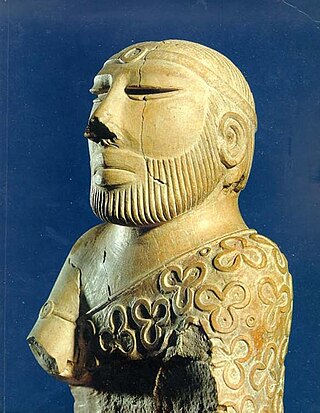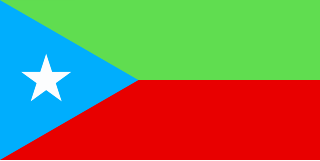Related Research Articles

The Baloch or Baluch are a nomadic, pastoral, ethnic group which speaks Western Iranic Baloch language and is native to the Balochistan region of South and Western Asia, encompassing the countries of Pakistan, Iran, and Afghanistan. There are also Baloch diaspora communities in neighbouring regions, including in Central Asia, and the Arabian Peninsula.
Bugti is a Baloch tribe found in eastern Balochistan, Pakistan. As of 2008, it was estimated to comprise over 180,000 people, mostly living in the Dera Bugti region of Pakistan. They are in turn divided into the Rahija, Marhita, Nothani, Perozani, Masori, Mondarani and Kalpar sub-tribes. Their neighbours to the north are the Marri, who were the Bugti's traditional enemies.

The history of Balochistan refers to the history of the Balochistan region of Pakistan, Iran and Afghanistan. Vague allusions to the region were found in Greek historical records of around 650 BCE. Prehistoric Balochistan dates to the Paleolithic.
The Marri are a Balochi-speaking tribe of the Baloch people, who inhabit a large arid region in northeastern Balochistan, Pakistan. The Marri area is bounded to the west by the plains of Sibi. To the north are the Kakar and Loni tribes of the Pashtuns; to the east lie the lands of the Khetrans, speakers of an Indo-Aryan language, Khetrani; to the south the Bugti tribe.

The Insurgency in Balochistan is an insurgency or revolt by Baloch nationalists and Islamist militants against the governments of Pakistan and Iran in the Balochistan region, which covers the Pakistani province of Balochistan, Iranian province of Sistan and Baluchestan Province in southeastern Iran, and the Balochistan region of southern Afghanistan. Rich in natural resources like natural gas, oil, coal, copper, sulphur, fluoride and gold, this is the largest, least populated and least developed province in Pakistan. Armed groups demand greater control of the province's natural resources and political autonomy. Baloch separatists have attacked civilians from other ethnicities throughout the province. In the 2010s, attacks against the Shia community by sectarian groups—though not always directly related to the political struggle—have risen, contributing to tensions in Balochistan. In Pakistan, the ethnic separatist insurgency is low-scale but ongoing mainly in southern Balochistan, as well as sectarian and religiously motivated militancy concentrated mainly in northern and central Balochistan.

The 1970s operation in Balochistan was a five-year military conflict in Balochistan, the largest province of Pakistan, between the Pakistan Army and Baloch separatists and tribesmen that lasted from 1973 to 1977.

The Balochistan Liberation Army, is a Baloch ethnonationalist militant organization based in Afghanistan. BLA's first recorded activity was during the summer of 2000, after it claimed credit for a series of bombing attacks on Pakistani authorities. BLA is listed as a terrorist organization by Pakistan, the United Kingdom, and the United States.
The Baloch Students Organization is a student organisation that campaigns for the students of Pakistan's Balochistan Province. It was founded as a student movement on 26 November 1967 in Karachi and remains the largest ethnic Baloch student body in the country. It got divided due to ideological differences. BSO Pajjar and BSO Mohiuddin are affiliated with the parliamentary framework of Pakistan. Dr Allah Nazar, founder of pro independence wing, in 2002 while he was studying in college, created a breakaway faction — BSO–Azad — that advocated struggle for an independent Balochistan based on pre-colonial Baloch country. The Pakistani government banned the BSO Azad on 15 March 2013, as a terrorist organisation.

The Balochistan Liberation Front is a militant group operating in the Balochistan region of southwestern Asia. The group was founded by Jumma Khan in 1964 in Damascus, and played an important role in the 1968–1973 insurgency in Sistan and Baluchestan province of Iran and 1973–1977 insurgency in Balochistan province of Pakistan. However, the group's insurgency was defeated in both Pakistan and Iran and the status of the group became unknown until 2004. The group re-emerged in 2004 after Allah Nazar Baloch took command of the group in 2003. Since then the group has taken responsibility for attacks on civilians, journalists, government officials and military personnel.
Popular Front for Armed Resistance, or PFAR, was a terrorist outfit formed during the 1960s. The group is responsible for series of bomb blasts in Pakistan. PFAR aim was independence of Baloch region from Pakistan. There has been no accurate independent estimate of the size or strength of PFAR. Most of outfit's activists were trained in Afghanistan. For the outfit, Afghanistan was good place to obtain weaponry and others goods.
Jumma Khan Marri is a senior Baloch political activist from Balochistan. He was formerly a member of Baloch separatist groups.

The 1973 raid on the Iraqi embassy in Pakistan was an armed infiltration carried out by Pakistan in February 1973 at the embassy of Ba'athist Iraq in Islamabad. The raid, carried out by the Pakistan Rangers and the Islamabad Police, was launched after the interception of information by Pakistani intelligence that uncovered large-scale covert Iraqi involvement in the supplication of weapons and funds to militants waging an insurgency against Iran and Pakistan in the Balochistan region situated between the two countries. Following the embassy raid, an abundance of funds and Soviet armaments from Iraq that were meant for Baloch insurgents were seized by Pakistani forces, and the Iraqi ambassador to Pakistan as well as the embassy's staff were immediately expelled from Pakistan and declared personae non gratae. Pakistan's findings in the embassy raid heightened tensions between Iran and Iraq, which, in 1974, escalated into armed clashes over the Shatt al-Arab, a river that was formerly subject to a territorial dispute between the two nations that later served as one of the key factors that propelled them into a full-scale and protracted war in 1980 following the Iranian Revolution. The event led to a severe deterioration in Iraq–Pakistan relations and contributed to Pakistan's heavy backing of Iran during the latter's eight-year-long war with Iraq.

Baloch nationalism is an ideology that asserts that the Baloch people, an ethnic group native to Pakistan, Iran and Afghanistan, form a distinct nation. The origins of modern Baloch nationalism coupled with the insurgency in Balochistan involving various militant organizations, go back to the period of the partition of British India and subsequent independence of Pakistan, when Kalat, the largest Baloch princely state, acceded to the Dominion of Pakistan.
There are or have been a number of separatist movements in Pakistan based on ethnic and regional nationalism, that have agitated for independence, and sometimes fighting the Pakistan state at various times during its history. As in many other countries, tension arises from the perception of minority/less powerful ethnic groups that other ethnicities dominate the politics and economics of the country to the detriment of those with less power and money. The government of Pakistan has attempted to subdue these separatist movements, which have included those in Bangladesh, the Baloch Liberation Front (BLF) in Balochistan; the "Sindhudesh" movement in Sindh province; "Balawaristan" in Gilgit-Baltistan; Jinnahpur and Muhajir Sooba movement for muhajir immigrants from India.

Balach Marri was a Pakistani Baloch separatist and militant leader, serving as the head the Balochistan Liberation Army (BLA), a separatist militant organisation fighting in Balochistan, listed as a terrorist organization by Pakistan, China, the United Kingdom, the United States and the European Union.

Javed Naseer Rind, also transliterated as Javed Nasir Rind, Javid Naseer Rind or Jawaid Naseer Rind, was an Urdu-language editor and columnist for the Daily Tawar and an active member of the Baloch National Movement. He was abducted 10 September 2011 and his corpse was discovered 5 November 2011 in Balochistan, Pakistan. He had been fired by the Baloch National Movement for reporting on the UK trial of Hyrbyair Marri and Faiz Baluch on charges of terrorism. Baloch Liberation Front, a terrorist group operating in Balochistan, took responsibility for killing him.

Hyrbyair Marri is a Pakistani activist from the province of Balochistan. He is the fifth son of the Baloch nationalist leader Khair Bakhsh Marri. As of 2017, he resides in London, England.

Mehran Marri is a British-Pakistani Baloch separatist and militant leader, currently serving as the head of United Baloch Army (UBA), a militant organization which is designated as a terrorist organisation by Pakistan and Switzerland.

United Baloch Army was a militant group, fighting for the separation of Balochistan. The group has been designated as a terrorist organisation by the Pakistani government. The government of Pakistan banned the group on 15 March 2013. The group has also been classified as a terrorist organisation by Switzerland's government.

Baloch Nationalist Army (BNA) (Urdu: بلوچ نیشنلسٹ آرمی) is a militant group, fighting for the separation of Balochistan province. The group was formed on January 11, 2022, out of a merger of the Baloch Republican Army (BRA), and the United Baloch Army (UBA). BRA and UBA also announced their dissolution following the establishment of Baloch Nationalist Army.
References
- ↑ Muhammad Tahir (3 April 2008). Tribes and Rebels: The Players in the Balochistan Insurgency. Vol. 6. The Jamestown Foundation.
- ↑ "Balochistan: Unrelenting Insurgency". Kashmir Herald. November 2009.